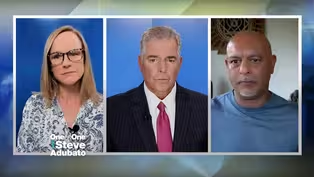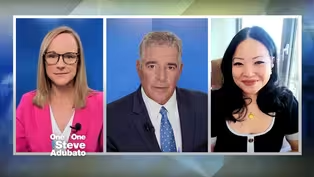One-on-One
Diana Henriques Highlights Her Novel "Taming The Street"
Clip: Season 2024 Episode 2670 | 7m 57sVideo has Closed Captions
Diana Henriques Highlights Her Novel "Taming The Street"
Award-winning journalist Diana B. Henriques, author of “Taming The Street,” joins Steve Adubato to explore FDR’s battle to regulate Wall Street after the 1929 stock market crash.
Problems playing video? | Closed Captioning Feedback
Problems playing video? | Closed Captioning Feedback
One-on-One is a local public television program presented by NJ PBS
One-on-One
Diana Henriques Highlights Her Novel "Taming The Street"
Clip: Season 2024 Episode 2670 | 7m 57sVideo has Closed Captions
Award-winning journalist Diana B. Henriques, author of “Taming The Street,” joins Steve Adubato to explore FDR’s battle to regulate Wall Street after the 1929 stock market crash.
Problems playing video? | Closed Captioning Feedback
How to Watch One-on-One
One-on-One is available to stream on pbs.org and the free PBS App, available on iPhone, Apple TV, Android TV, Android smartphones, Amazon Fire TV, Amazon Fire Tablet, Roku, Samsung Smart TV, and Vizio.
Providing Support for PBS.org
Learn Moreabout PBS online sponsorship(upbeat music) - We're now joined by Diana Henriques, who is the author of the book, "The Wizard of Lies, Bernie Madoff and The Death of Trust."
We did a separate segment with Diana, all about the Bernie Madoff case.
Go on our website and check it out.
But Diana has a new book coming out.
Is it about FDR?
- It is Steve.
It's a story I've wanted to tell for decades, and it's about FDRs unprecedented effort to regulate Wall Street when he took office in 1933 and the aftermath of the 1929 crash.
- Post Herbert Hoover.
- Yes, post Herbert Hoover and Calvin Coolidge and Warren Harding, who gave us... - Oh, those guys.
- Those guys gave us the roaring twenties.
And while it's remembered in our kind of glossy, you know, memory bank as this wonderful time of flappers and cocktails and Stutz Bearcats and raccoon coats, in fact, it was a time of incredibly unequal prosperity and a time when the financial markets, especially the aspects of the financial world we all rely on today, banks, mutual funds, Wall Street investments for our retirement savings were a jungle.
They were absolutely a jungle, largely unregulated, dominated by the richest and most powerful.
And the little people, the ordinary investors were chewed up and spit out by that system.
FDR came of age during that decade.
He became governor of New York in 1928.
So he had spent his adult life on the doorstep of Wall Street, actually worked briefly at a Wall Street law firm as a young man before he was crippled with polio.
And when he saw what wreckage this unregulated wild west marketplace had created, he made it one of his core priorities in the new deal to tame the street, to reign in this kind of ruthless predatory finance so that average people like you and me could safely put our money in banks, could safely invest our savings in mutual funds, and could really participate in American capitalism in a way that we could not have safely done just a decade earlier.
- By the way, I should have mentioned, in addition to the book on Bernie Madoff, Diana is one of the country's top financial journalist and award-winning journalist and respected by so many in the field of finance and Wall Street and etc, etc.
How about this, the SEC, the Securities and Exchange Commission, did that come out of Franklin Delano Roosevelt's administration?
- It did, it was born in June of 1934, and its first chairman was Joseph P. Kennedy, the father of President Kennedy.
- Wait, hold on.
But he was... - Yes.
- But Ambassador, hold on.
Ambassador when?
And then head of the SEC when?
- Head of the SEC first, that was his first government job, was as chairman of the SEC in 1934.
It was after he left the SEC, he became the very controversial US ambassador to Great Britain on the eve of World War II.
So an incredibly complex character.
My book, which is called "Taming the Street."
- Say it again, "Taming the Street."
- "Taming the Street: The Old Guard, the New Deal, and FDRs Fight to Regulate American Capitalism."
And while FDR and Joe Kennedy are two of the figures I focus on, two others are William O. Douglas, who most of us my age remember as a life long, one of the longest serving Supreme Court justices in history.
Yes, and a great civil libertarian.
Yes, great civil libertarian and early environmentalist.
So this was before he ever dreamed of going on the Supreme Court.
He became the third chairman of the SEC.
So my book looks at the very early years of the SEC and how FDR envisioned it as the cop on Wall Street and the battles that they fought.
And one of those biggest battles was with the fourth character Richard Whitney, who was this incredibly patrician president of the New York Stock Exchange, who was secretly a crook.
So it's quite a story and a lot of dramatic developments.
- A totally inappropriate question.
Joseph Kennedy becomes the head of the SEC first.
- Yes.
- Did that get in the way of his bootlegging business?
- You know, there's no evidence at all that he was a bootlegger.
I do deal with this, but my editor made me move it through a footnote.
So check the footnotes.
- In public broadcasting we have to only go with facts.
So it's not a proven fact.
- No, it is not.
Absolutely not.
And highly dubious.
After he left private practice and went to work for the SEC, he went through two, three subsequent senate confirmation investigations at a time when he was already pretty controversial.
And you know, there are a lot of people... - Is that because of isolationist as policy or did that come later?
- Partly that, partly his growing isolationism, partly just his personality.
He was always gonna be the smartest guy in the room.
He had nothing but contempt for other people who didn't think we were as smart as he was.
- And wanted to be President.
- And many people felt he was going behind Roosevelt's back to secretly, you know, try to become a candidate for the 1940 election before FDR had quite decided what he was going to do about the 1940 election.
So he wasn't fully trusted even by FDR's own people.
So we have to believe that if anybody could have turned over a rock and come up with evidence that he was a bootlegger, they'd have used it and they never did.
- That was totally inappropriate and irresponsible on my part.
I apologize.
Biggest lesson, particularly for those who follow Wall Street on a regular basis, and more and more average citizens are participating in the stock market and Wall Street.
Biggest lesson from the regulatory initiatives and the zealous, I don't mean that in a negative way, but the very aggressive regulatory efforts of the Roosevelt administration.
Biggest lesson we should take from that for all investors today is?
- Roosevelt was right.
He was right.
That we needed to regulate the world of finance to keep it safe for ordinary investors.
He was right then.
He's still right today.
- Diana, I wanna thank you so much for joining us.
We appreciate it.
- It was a delight to be with you, Steve, thanks.
- Thank you, stay with us.
We'll be right back.
- [Narrator] One-On-One with Steve Adubato has been a production of the Caucus Educational Corporation.
Celebrating 30 years in public broadcasting.
Funding has been provided by Wells Fargo.
Newark Board of Education.
PSEG Foundation.
New Jersey Sharing Network.
The Fidelco Group.
Holy Name.
New Jersey’s Clean Energy program.
PSE&G, And by The Adler Aphasia Center.
Promotional support provided by Meadowlands Chamber.
And by NJ.Com.
Transcendent Leadership and Shifting Workplace Culture
Video has Closed Captions
Clip: S2024 Ep2670 | 10m 43s | Transcendent Leadership and Shifting Workplace Culture (10m 43s)
Why Compassion and Empathy is Needed in Business
Video has Closed Captions
Clip: S2024 Ep2670 | 9m 53s | Why Compassion and Empathy is Needed in Business (9m 53s)
Providing Support for PBS.org
Learn Moreabout PBS online sponsorship
- News and Public Affairs

Top journalists deliver compelling original analysis of the hour's headlines.

- News and Public Affairs

FRONTLINE is investigative journalism that questions, explains and changes our world.












Support for PBS provided by:
One-on-One is a local public television program presented by NJ PBS

